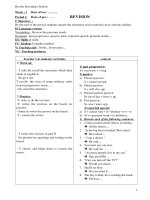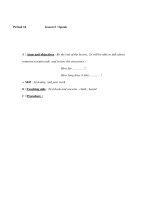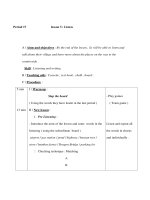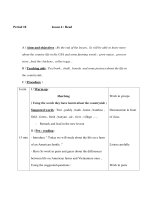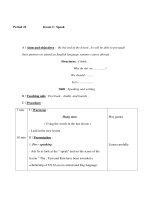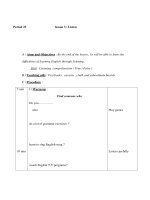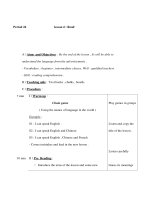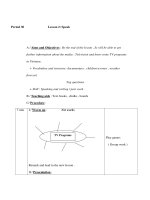Tài liệu Giáo án anh văn lớp 9 pdf
Bạn đang xem bản rút gọn của tài liệu. Xem và tải ngay bản đầy đủ của tài liệu tại đây (1.05 MB, 64 trang )
Bu nho Secondary School
Week : 1 Date of tea: …………….
Period 1: Date of pre : ………….. REVISION
I/ Objectives ;
By the end of the period, students master the structures and words they have already studied.
II/ Language content :
Vocabulary : Review the previous words
Grammar: past progressive, passive form, reported speech, pronoun words,….
III / Skills :4 skills
IV/ Method: Complex method
V/ Teaching aids : books , lesson plan….
VI / Teaching produces;
Teacher’s & students’ activities content
1/ Warm up:
- T asks Sts recall the structures which they
study in english 8.
- Sts give out.
T recalls the ways of using ordinary verbs in
past progressive tense,……
- Sts smart the structeres.
2/ Practice:
-T: Asks ss do the excrises
-T: writes the excrises on the board, sts
practise
- Some sts write the answer on the board
-T : corects the errors.
-
- T writes the excrises in part II
- Sts practise by speaking and writing on the
board.
- T checks and helps them to correct the
errors.
1/ past progressive:
S+ was/were + v+ing
2/ passive:
a) Present passive:
S + is/am/ are+pp
b) Future passive:
S + will +be +pp
c) Present perfect passive:
S+ have/ has + been + pp
d) Past passive:
S+ was / were +pp
3/ reported speech:
a) S + asked/ told + if / whether +s+v +o
b) S+v+ question word + to infinitive.
1) Rewrite each of the following sentences:
1. 1/ they posted all the letters yesterday.
All the letters…..
2. “Is the big ben in london”Mai asked.
Mai asked…..
3. “ I am a doctor “
He said……
4. You must pay me now.
He said me …..
5. “ do many people live at my son”
Nga ased Mai ….
6. “Can you turn off the TV?”
Would you mind…..
7. Shall I sit here.
Do you mind if …..
8. The boy is Bad, he is reading the book.
The boy…..
1
Bu nho Secondary School
4/ Production:
T : reminds all the structures which have
reviewed
5/ Homework:
Learn by heart the structures
Prepare the next lesson :unit1 “ a visit from a
pen pal” – “getting started- listen and read”
II/ Choose the best answer:
1) The book _____ in blue paper is
mine(wraps, wrapped, wrapping)
2) ___you mind if I smoked? ( do, would ,
could)
3) We ___dinner when the phone__ ( had/
was ringging, were having/ was ringging.
4) Finally, we decided ___ to the concert (to
go, going, go).
5) ………..
Past progressive,
Passive form,
Reported speech
……
-----o0o-----
Experiences :
……………………………………………………………………………………………………………………………………………………………………………………………………
……………………………………………………………………………………………………………………………………………………………………………………………………
………………………………………………………………………………………………………………………………………………………
Week:1/ Date of tea: UNIT:1 A VISIT FROM A PEN PAL
2
Bu nho Secondary School
Period: 2/ Date of pre: GETTING STARTED & LISTEN AND READ
I/ Objectives;
-By the end of the lesson, S will be able to know about some places Lan went to with a
foreign friend and some activities they took part in together.
-Ss can master the simple past after wish
II/ Language content ;
Vocabulary:Correspond, impress, friendliness, mosque, pray, primary, mausolesum, keep in touch.
Grammar : wish sentence, used to
III/ Skills : listening, speaking, reading.
IV/ Method ; Communicative approach ,ask –answer.
V/ Teaching aids ;
- Students’ & teacher’s books.
- Pictures , lesson plan, stereo.
VI/ Procedures
Teacher’s & students’ activities content
1/ Warm up:
-Tguides sts play the game “networks” about
famous places in Hanoi
-Sts find out some place famous in Hanoi that
they have known.
-After finishing the game T gives some more
famous places in Hanoi (using pictures)
2/ Presentation:
T asks some questions
- StS answer
………
Do you have any pen pal?
What activities would you like to do
during the visit?
I think I take my friend to beach where we
can swim and then we will go to the
market where we can buy some food,….
Listen and read:
Lan’s Malaysian pen pal,…
* Vocabulary:
Correspond, impress, friendliness,
mosque, mausoleum, pray, primary,used
to,..
* Key Answers :
3
Bu nho Secondary School
-T introduces part 2 and asks ss listen the text
-Sts listen the text two times.
-Ss repeat after T.
-T teaches the newwords in the text.
-T reads the newwords first Ss repeat many
times.
-T reviews structure “used to”
.3/ Practice:
-T asks ss read the text silently and then do
the exercise (pairwork)
-Sts read the text again and choose the correct
option to complete the sentences on page 7
-Sts work in pairs
-T corrects
-Sts read the text aloud.
Anothers remark their pronunciation
4/ Production:
T asks ss recommend places of interest in their
city.
Ss: discuss where they should take their friends
and what activities they should do.
5/ Homework:
Learn by heart the new words and read the text
again.
Prepare the next lesson.” Speak and listen”.
1. c. two week.
2.b. Hn people were friendly.
3.d. all the above.
4.b .invite Lan to Kuala Lumpur.
(Dalat:sight-seeing, Vung tau: swimming, …)
S2: I think we should take our friends to
Vung Tau . we can swim and sunbathe on the
beach
S2: Good idea. I believe they will be
interested in it
-----o0o-----
* Experiences :
……………………………………………………………………………………………………………………………………………………………………………………………………
…………………………………………………………………………………………………………………………………
……………………………………………………………………………………………………………………………………………………………………………………………………
……………………
Week:2 / Date of tea:
Period 3: / Date of pre: UNIT:1 A VISIT FROM A PEN PAL
4
Bu nho Secondary School
SPEAK AND LISTEN
I/ Objectives :
-By the end of the lesson, S will be able to make and respond to introduction
pen pal
II/ Language content:
Vocabulary (review), take a bus, walk on the grass
Grammar The present simple, present perfect, The simple past, near future
Let me introduce myself
Pleased to meet you.
III/ Skills: listening, speaking
III/ Method : Communicative approach.
IV/ Teaching aids:
- Students’ & teacher’s books.
- Pictures , stereo, lesson plan.
V/ Procedures :
Teacher’s & students’ activities content
1/ Warm up:
T asks ss play the game”ø introduce myself”
2/ Pre- speaking:
T asks ss to look at the pictures part
speak{sgk}and introduce the situation (using
picture)
T; asks ss arrrange the dialogue (pairwork)
Ss put the sentences in the correct order to
make a complete dialogue
Ask ss to practice speaking in the dialogue
3/ While- speaking:
S practice reading the dialog in pairs.
Checking S’ comprehension
T asks ss answer the questions about the
dialogue
Apply to make new dialogs based on the cues
Name, age, hobies, home,,,
Ex: my name’s Hoa. I’m 15 years old. I live
in Binh Phuoc. I love the beach, there are
four people in my family. I like reading
book and watching TV in my free time,…
What can you imagine they will say to each
other ?
Nga is talking to Maryam. They are waiting
for Lan outside her school. Put the dialogue
in the correct order to make a complete
dialogue.
* Answers
1+ c, 5+ b, 4+ d, 2+ e, 3+ a, 6+ f
EX.
A: you must be Maryam.
B: that’s right, I’m.
A: pleased to meet you. Let me introduce
myself, I’m Nga
B: Pleased to meet you, Nga…
- Have Nga and Maryam met ech
other before?
- Is Maryam enjoy her stay in VN?
- What does she like in VN?
Now you use the information in the book
and make similar dialogue introduction
yourself to Maryam’s friends.
5
Bu nho Secondary School
4/ Post- speaking:
Write a passage about one of the persons
above
5/ Pre- listening:
Introducing the situation:
Task 1: prediction
S look at the pictures and tell what there is in
each one,
6/ while- listening :
S listen to the tape to check their guess
(groups)
T gives feedback:
7/Post-listening:
Students listen again
8/ Homework:
Ask ss to write the dialogue in their notebook
and learn by heart .
Prepare period 4
Tuan: Are you Yoko ?
Yoko: that’s right, I am.
Tuan: nice to meet you, let me introduce
myself, my name’s tuan.
Yoko: me too. Do you live in phan thiet.?
Tuan: yes, I do. Is it the first time you have
been to phan thiet.?
Yoko: yes, PT is a very nice city. People
here are very friendly.
Tuan: where do you live in Japan?
Yoko: I live in Tokyo. It’s a very big capital
city. Have you been there?
Tuan: I hope I will be able to go there next
summer.
Example:Yoko is from Tokyo, the capital of
Japan. She is Lan’s pen pal. This is her first
visit to VN. She likes Vietnamese people
and loves old cities in VN
listen
Tim Jone’s Mexican pen pal, Carlos, is
visiting the USA. Listen to their conversation
and check the number of the correct picture
where the place is, what the people are
doing
“a” picture 1: we aren’t allowed to walk on
grass.
Picture 2: we aren’t allowed to pick flower
“b” picture1: the bus is red and its number
is 103
Picture 2: the bus is blue and its number is
130.
…
A} 1; b} 2; c} 2
-----o0o-----
Week :2/ Date of tea: UNIT:1 A VISIT FROM A PEN PAL
Period: 4/ Date of pre: READ
I/ Objectives :
By the end of the lesson, S will have some knowledge about Malaysia, one of the countries in Asian.
II/ Language content :
6
Bu nho Secondary School
vocabulary Tropical climate, unit of currency, national language, Islam, comprise, official religion,
compulsory,….
grammar: Review the present tense
III/ Method (Ph ương pháp ) : Communicative approach.
IV/ Skills : listening, speaking, reading
V/ Teaing aids :
- Students’ & teacher’s books, lesson plan.
- Pictures , the map of Malaysia’s country
V/ Procedures:
Teacher’s & students’ activities content
1/ Warm up:
-Tasks ss to look at the picture” Petronas
TwinTowers.”
- Tasks questions about Malaysia’s country.
2/ Pre – reading:
-T introduces the lesson.
-Asks ss play the game “Matching”
trough the game teacher teaches the
newwords in the table.
Ss guess.
3/ While:
Ss discuss about Malaysia and compare your
guess with the information in the book.
Correct the wrong guess
Some ss give the answer
st read the text again then decide whether
statements are true are false
Ss work in pairs
Some ss read the answer and explain (show
the information that have in the text)
T corrects.
T explains some newwords
1/ where is it?
2/ what’s the capital of Malaysia?
3/ What’s its population?
4/ what language is spoken in this
country?
Today,We’ll learn more about Malaysia a
member country of ASEAN. Before reading
the text, you work in groups and complete
the table
Malaysia.
1. Area:
2. Population
3. Climate
4. Unit of currency
5. Capital city
6. Official religion
7. National language
8. Compulsory second language
(1) 329 758
(2) Over 22 million
(3) Tropical climate
(4) The ringgit
(5) Kuala lumpur
(6) Islam
(7) Bahasa Malaysia
(8) English
Newwords
ASEAN = Association of south east Asian
Nations.
Comprise
Tropical climate
Unit of currency
Islam
7
Bu nho Secondary School
4/ Post reading.
Read aloud the text and check the
pronunciation
Remind the information about Malaysia
5/ Homework:
Learn by heart the newwords and read the
text some more
Prepare the next lesson “ write”
Official religion
Divide
Separate
Region……
(b) true or false
1. T.
2. F. ( there are more than two religions)
3. F. (English, chinese and tamil are also
widely spoken. )
4. F. (One of the three : Malay, Chinese.
Tamil.)
…….
Malaysia is one of the countries of Asean.
The Malaysian unit of currency is the
ringgit.
-----o0o-----
*Experiences :
……………………………………………………………………………………………………………………………………………………………………………………………………
…………………………………………………………………………………………………………………………………
Week: 3/ Date of tea: UNIT: 1 A VISIT FROM A PEN PAL
Period: 5/ Date of Pre: WRITE
I/ Objectives :
By the end of the lesson, S will be able to write a personal letter telling about their visit to
some places.
II/ Language content:
Vocabulary: Visiting.
Grammar: present perfect tense.
III/ skills: listening , reading, writing
IV/ Method : Direct, translation, communicate methods.
V/ Teaching aids :
- Students’ & teacher’s books.
- Extra-board, lesson plan.
VI/ Procedures:
Teacher’s & students’ activities content
1/ Warm up:
T asks some questions Ss answer
2/ Pre – writing:
Questions
1. Do you often write letter?
2. 2. Who did you write to?
8
Bu nho Secondary School
T introduces the lesson
Ss answer some questions
T asks ss work individually and work in pairs
Remind ss about the format of a personal
letter by asking the question
Asks ss to look at the outline
3/ While- writing.:
Asking S to write a letter to their family to
tell about their visit following the outline on
page 11
T observes and gives S vocabulary if needed
*suggested ideas:
- Sts wtite on the board.
- T helps them to correct the errors.
4/ Pos- writing:
3. When did you write ?.....
Imagine you are visiting your friends
/relatives in another part of VN. Write a
letter to your family to tell about your visit
When did - arrive in ….?
Who meet you at the bus /train?
Which places did you visit?
Who did you meet during the visit?
What kinds of food did you eat?
What did you buy?
How do you feel about the visit?
Are you happy?
What are the parts of a personal letter?
-To have a photo taken,-Souvernirs
-Speciality
Dear Loan,
I arrived at Hue Railway station at 7 am on
sunday. Uncle Hung took me home by taxi.
I’ve visited the Imperial city. I was amazed
by magnificient monument there. I also
went to Dong Da market, the biggest
market in Hue. This is the place where I
bought a lot of souvenirs. Yesterday uncle
Hung and I went to eat beef noodle. I
enjoyed it very much. I’ll leave Hue on
Saturday. I’m so happy. People in Hue very
nice and friendly. I’ll miss them very much.
The train is scheduled to come to BT at 5
pm. Please pick me up at the station. I’m
looking forward to meeting and telling you
about the trip in Hue.
See you then.
Yours.
First paragraph
9
Bu nho Secondary School
Ss read again the letter
Ss remind the format of a personal letter
5/ Homework:
S write their letters after correction in their
notebooks
See “ language focus”
Second paragraph
Third paragraph
-----o0o-----
• Experiences;
…………………………………………………………………………………………………………………………………………………………………………………………………
…………………………………………………………………………………………………………………………………………………………………………………………………
………….
…………………………………………………………………………………………………………………………………………………………………………………………………
…………………………………………………………………………………………………………………………………………………………………………………………………
…………
Week:3/ Date of tea: UNIT:1 A VISIT FROM A PEN PAL
Period:6/ Date of pre: LANGUAGE FOCUS
I/ Objectives :
By the end of the lesson, S will be able to use the past simple, the past simple with wish
II/ Language content :
Vocabulary: Review
Grammar: the simple past, the past simple with “wish”
III/ Skills: 4 skills
IV Method : Communicative approach, ask – answer.
V/ Teaching aid :
- Students’ & teacher’s books.
- pictures,..
VI/ Procedures :
Teacher’s & students’ activities content
1/ Warm up:
Teacher gives some verbs in infinitive and
devided the class into 2 groups . T asked 1
Infinitive Past tense
meet
10
Bu nho Secondary School
Ss / each group to go to the board to write
those into simple past. The winner is the S
who can write more , exactly in 2 minutes
2/ Practice:
Act1 :
: Set the scene: this is the conversation b/t
Tan & Phong. They are talking about what
Ba did on the weekend:
Explanation: recalling the simple past
S work in pairs: ask and answer about what
Ba, Nga and Lan did on the weekend
(exercise 1/ p 11)
Possible conversations:
Act2
Set the scene: Lan and her friends are
holding a farewell party for Maryam. Write
the things they did to prepare for the party
S use the words and pictures in the box
(these action happened at a definite time in
the past)
Act 3
*Set the scene: Relating to the text: At the
end of the visit, Explanation: what tense is
used after wish ?
Wish is used when we want to be different
and opposite of the truth
S apply to do the exercise:
Note:be “were”
4/ production
Remind the rules.
S make three wishes of their own
5/ Homework:
Learn new words and the rules.
Prepare the next lesson unit 2 “ getting
started & listen and read”
see
Go
Buy
Have
……
Ex
1:
A: what did Nga do on the weekend?
B: She went to a concert performed by Hanoi
singers.
A: When did she go to see it?
B: she saw it on saturday evening at 8 pm.
……
Ex
2
: Lan and her friends are holding a
farewell party for Mayram. Write the things
they did for the party.
1. Mai made a cake.
2. Tung hung colorful lamps on the walls
in the room.
3. Lan bought flowers
4. Tuan painted a picture of Hanoi.
5. Loan and nga went shopping.
what did Lan say to Maryam?- She said:
“ I wish I had a longer vacation “
…………………
S + WISH+ S + PAST SIMPLE
a)…
b) I wish I were in the swimming fool now.
c) I wish I had a computer.
d) I wish I lived close to school
e) I wish I had a sister.
f) I wish I drew well.
g) I wish I had my friend’s phone number.
h) I wish I knew many friends.
i) I wish I there were rivers and lakes in my
hometown.
* Past tense & the past simple with “wish”
Used to
Ex: I wish I had a new bike.
I wish I were a teacher
11
Bu nho Secondary School
-----o0o----
• Experiences;
…………………………………………………………………………………………………………………………………………………………………………………………………
…………………………………………………………………………………………………………………………………………………………………………………………………
………….
…………………………………………………………………………………………………………………………………………………………………………………………………
…………………………………………………………………………………………………………………………………………………………………………………………………
…………
Week:4/ Date of Tea: UNIT:2 CLOTHING
Period :7/ Date of pre: GETTING STARTED & LISTEN AND READ
I/ Objectives :
By the end of the lesson, students will be able to some more about ao dai , the traditional
dress of Vietmese women
II/ Language content:
Vocabulary: traditional dress, long silk tunic, material, fashionable,…
Grammar: the present perfect.
III/ Method :Communicative approach.
IV/ Skills: listening, reading, speaking.
V/ Teaching aid:
- Students’ & teacher’s books.
- Pictures
- Real objects: ao dai,…
VI/ Procedures:
12
Bu nho Secondary School
Teacher’s & students’ activities content
1/ Warm up:
T: ask ss to recall the structure (the simple
past with “wish”)
2/ Presentation:
T: introduces the new lesson
Ask ss look at the pictures and decide where
each person comes from
Having some ss read the answer
T: corrects
T: asks some questions.ss answer
Have ss listen the text
Ss listen the text and then repeat after the T
T: explains some new words
Ss : read the new words(choral and individual)
.3/ Practice:
Ss read in silence the text
T: ask sss answer and explain
T: corrects
Ss read the text again and answer the
questions
Ss pratise in pair.
S + WISH +S + PAST SIMPLE
Ex: I wish I were taller.
1/ Getting started:
Decide where each person comes from.
She comes from japan, she is wearing a
Kimono.
She comes from vietnam. She is
wearing an ao dai.
….
What do you know about Aodai?
What material is Aodai made from?
Who wears Aodai?
2/ Listen and read:
New words:
Poet (n)
Traditional designs(n)
Fashionable (adj)
Musician(n)
Poem (n)
Long silk tunic (n)
Writer (n)
Loose pants (n)
Novel (n)
ethnic minorities(n)
(a) Complete the sentences .
1. ….. poems, novels, and songs.
2. …long silk tunic with slits up the
sides worn over loose pants.
3. … to wear modern clothing at work.
4. ….line of poetry on it.
5. .. symbols such as suns, stars, crosses
and stripes.
(b) Anwer the questions :
1/ Traditionally, men and women used to
wear the aodai.
13
Bu nho Secondary School
T: corrects
4/ Production:
Ss remind the names of the clothings
5/ Homework:
- Do exercises
- Learn by heart the new words and read
the text once more
- Prepare the next lesson.” Speak “
2/ Because it is more convenient.
3/ They have printed lines of peotry on it or
have added symbol such as suns, stars,
crosses, striped to the aodai.
Kimono (Japan)
……
-----o0o-----
• Experiences;
…………………………………………………………………………………………………………………………………………………………………………………………………
…………………………………………………………………………………………………………………………………………………………………………………………………
………….
…………………………………………………………………………………………………………………………………………………………………………………………………
…………………………………………………………………………………………………………………………………………………………………………………………………
…………
Week:4/ Date of pre: UNIT:2 CLOTHING
Period: 8/ Date of tea: SPEAK
I/ Objectives :
By the end of the lesson, students will be able to ask and answer about the hobies , the
habits about the clothing, which they wear everyday.
II/ Language content :
Vocabulary: colorful T- shirt, plaid skirt, plain suit, blue shorts,….
-Grammar : The present perfect tense, the passive (review).
III/ Skills: listening, speaking.
IV/ Method : Communicative approach.
V/ Teaching aids :
- Students’ & teacher’s books.
14
Bu nho Secondary School
- Pictures , lesson plan.
VI/ Procedures :
Teacher’s & students’ activities content
1/ Warm up:
Ss answer some questions
2/ Pre- speaking:
T: introduces the new lesson
T: Asks ss look at the pictures and match the
phrases to the pictures.
T Explains the new words
Ss match the phrases to the pictures and read
the answer in front of class
T: corrects and have ss read the new words
3/ While-speaking:
- Ss :work in groups , read and write 2 more
questions for the last section of the survey
about students’ wear:
T: asks ss do the excrises in part c
Ss work in groups
Ss : interview their friends and then fill in the
survey
(groupwork)
- T : Asks S to report the result of the survey
Ex: group 1:
4/ Post:
T asks ss recall the names of the clothings
5/ Homework:
- S make a list of types of clothing that most
S in the class like wearing on special cases
Learn by heart the new words
Prepare the next lesson “listen”
1/ What do you usually wear on the
weeken ?
2/ ………………… on school?.
Today, we will learn about the casual clothes
that we wear daily
(a) Match the phrases to the pictures.
a. A colorfull T- shirt.
b. A sleeveless sweater.
c. A striped shirt.
d. A plain suit.
e. Faded jeans
f. A short- sleeved blouse
g. Baggy pants
h. A plaid skirt
i. Blue shorts
(b)What type of clothing do you wear on Tet
holiday?
What do you wear when you go to a party?
What would you wear to a party?
…….
©
Group 1::
Four people said that they like their uniform.
Group 2:
Two people said that they usually wore
colorfull T- shirt on the weekends.
Höông said that she liked to wear faded
jeans on the weekends.
Colorfull T-shirt
Sleeveless sweater
Faded jeans
Plaid skirt,
….
15
Bu nho Secondary School
.
-----o0o-----
• Experiences;
…………………………………………………………………………………………………………………………………………………………………………………………………
…………………………………………………………………………………………………………………………………………………………………………………………………
………….
…………………………………………………………………………………………………………………………………………………………………………………………………
…………………………………………………………………………………………………………………………………………………………………………………………………
…………
Week: 5/ Date of tea: UNIT:2 CLOTHING
Period: 9/ Date of pre: LISTEN
I/ Objectives :
By the end of the lesson, S will be able to listen for a specific information, and describe what
people are wearing
II/ Language content :
Vocabulary : public, announcement, floral pants, polka dot skirt, sandal, missing, entrance, car
fair, doll,…
Grammar : Review.
III/ Method:
IV Skills: listening ,speaking,
V/ Teaching aids :
- Students’ & teacher’s books.
16
Bu nho Secondary School
- Pictures
- Cassette, tape, lesson plan.
VI/ Procedures :
Teacher’s & students’ activities content
1/ Warm up:
T asks ss play the game ”networks” about
the clothings
Ss complete the task.
2/ Pre- listening:
Ss look at the pictures {a,b,c}
T: Introduces the context and ask ss” what’s
the name of the clothing in pictures”
Ss answer
T explains the name of the clothing in the
pictures
Ss listen
3/ While-listening:
Now you will hear an anouncement and try
to answer quickly
T :asks ss to listen & answer:
Ss :Listen & choose the correct picture
showing what Mary is wearing
4/ Post-listening:
You will hear a public announcememt about a
lost little girl called Mary. First, you name the
clothes in the picture,…
A} a/ A: floral pants.
B: blue shorts
C: polka dot skirt.
B} A: long-sleeved white blouse.
B: short- sleeved pink shirt.
C: short- sleeved white shirt.
C} A: sandals
B: boots.
C: shoes with flowers.
Answers
a/ B: she’s wearing blue shorts
b/ A: she’s wearing a long sleeved blouse.
c/ C :she’s wearing brown shoes
17
Bu nho Secondary School
T sticks 5 pictures of people on the board.
Asking 2 Ss to take turn to describe 2
persons and asking the class to guess who
they are
5/ Homework:
- S write a short paragraph to describe
themselves
Prepare the new lesson “read”.
Ex: This person is wearing jeans
………..
.
-----o0o-----
• Experiences;
…………………………………………………………………………………………………………………………………………………………………………………………………
…………………………………………………………………………………………………………………………………………………………………………………………………
………….
…………………………………………………………………………………………………………………………………………………………………………………………………
…………………………………………………………………………………………………………………………………………………………………………………………………
…………
Week:5/ Date of tea: UNIT:2 CLOTHING
Period:10/ Date of pre: READ
I/ Objectives :
By the end of the lesson, S will be able to understand the text for details, about jeans
II/ Language content:
Vocabulary : made from , named after, embroidered jeans. Painted jeans, generation, label, out
of fashion, …
Grammar : Review, passive.
III/ Method :Communicative approach, ask –answer.
IV/ Skills : reading, speaking.
V/ Teaching aids :
18
Bu nho Secondary School
- Students’ & teacher’s books.
- Pictures
V/ Procedures :
Teacher’s & students’ activities content
1/ Warm up:
T: asks ss play the game “brainstorming”
about the jeans
2/ Pre – reading:
-Ss look at the picture and answer some
questions
-T reads the test first Ss listen and repeat .
-Ss find out the newwords and explain the
meaning of them.
- T reads the newwords first Ss repeat
3/ While-reading:
T: asks ss read the text and complete the
sentenses
T gives out the cues and asks Ss answer
T correts.
Ss read the text quickly and answer the
questions
Ss ask and answer pairwork
T: corrects the errors.
Some ss read the text again to check the
pronunciation
4/ Post-reading:
Newwords
1. Sailor
2. Designer
3. Embroidered
4. Label
5. Out of fashion
6. Generation
……………
(a) fill in the missing dates and words*
Answers
1 18century……..jeanscloth…
2 1960s………students…….
3 1970………..cheaper……
4 1980s……….fashion……..
5 1990s…………sale……….
( b) Answer:
1/ the word “ jeans” comes from a kind of
material that was made in Europe.
2/ the 1960s fashions were embroidered
jeans, painted jeans, and so on.
3/ because jeans became cheaper.
19
Bu nho Secondary School
T : asks Ss to read silently again and answer
True /false( groupwork)
Having some ss read the answer
T: corrects the errors.
5/ Homework:
Learn by heart the new word and read the once
more.
Prepare the next lesson “write”.
4/ Jeans at last became high fashion
clothing in the 1980s
.Execrise: True or False:
1/ the word “Jeans” comes from a kind of
material that was made in Asia.
2/ Many students wore Jeans in the 1960s
…
----o0o-----
• Experiences;
…………………………………………………………………………………………………………………………………………………………………………………………………
…………………………………………………………………………………………………………………………………………………………………………………………………
………….
…………………………………………………………………………………………………………………………………………………………………………………………………
…………………………………………………………………………………………………………………………………………………………………………………………………
…………
Week:6/ Date of tea: UNIT 2: CLOTHING
Period:11/ Date of pre: WRITE
I/ Objectives :
Students will be able to write an explosition, presenting one side of an argument
II/ Language content:
Vocabulary : be equal in, be prond of, bear, self- confident, encourage, ..
Grammar : in my opinion, I think, firstly, secondly, finally
III/ Method : Complex methods.
IV/ Skills :speaking, writing.
IV/ Teaching aids:
Book, textbook, lesson plan,…
V/ Procedures;:
Teacher’s & students’ activities content
1/ Warm up:
Ss read the text again ( read/ page17)
And answer the questions about the content
1/ Where does the word jeans comes from?
2/ what were the 1960’s fashion?
20
Bu nho Secondary School
of the text
2/ Pre – writing:
T: asks ss read the execrises/( page 18)
T: introduces an argument should have:
T: asks ss read the outline :
Based on the outline A page 18
S : read the passage after studying the topic
and the outline A
T: explains some new words
3/ While-Writing:
S : read the topic and outline B, then write a
paragraph of 100- 150 words. Then compare
their writing with partner’s
T : takes some writings and corrects them in
class
4/ Post-writing:
One Ss write the paragraph on the board
T remarks and correts
5/ Homework:
S : write the exposition (has been corrected
yet ) in the notebooks
Prepare the next lesson “ Language focus”
*Ways how to write an argument
* New words
-encourage
-equal
-bear
-practical
* Key answers
I think, secondary school students should
wear casual clothes.
Firstly, casual clothes make students feel
comfortable.
Secondly, wearing casual clothes gives
students feedom of choice, they have right
to choose sizes, colors, and fashion that they
love.
Thirdly, casual clothes make students feel
confident when they are in their favorite
clothes.
Finally, casual clothes make school more
colorful and lively.
In conclusion, secondary school students
should wear casual clothes .
Wearing casual clothes is convenient,
comfortable, and fun.
21
Bu nho Secondary School
-----o0o-----
• Experiences;
…………………………………………………………………………………………………………………………………………………………………………………………………
…………………………………………………………………………………………………………………………………………………………………………………………………
………….
…………………………………………………………………………………………………………………………………………………………………………………………………
…………………………………………………………………………………………………………………………………………………………………………………………………
…………
Week:6/ Date of tea: UNIT:2 CLOTHING
Period:12/ Date of pre: LANGUAGE FOCUS
I/ Objectives:
Students will be able to use the present perfect tense and the passive form of present perfect,
simple present, simple past, simple future tense
II/ Language content:
Vocabulary : Review
Grammar:: : the present perfect, passive.
III/ Method : ask and answe, comunitive, direct… methods.
IV/ Skills: 4 skills.
V/ Teaching aid:
Book, textbook, pattern drills, lesson plan…
VI/ Procedures:
Teacher’s & students’ activities Content
1/ Warm up:
*Chating
- Have you ever gone abroad ?
22
Bu nho Secondary School
T : asks some questions
S : answer
T : asks Ss to pay attention to “ Have you
ever…..” and explain the differences and the
similarities between “How long“ and“When
“
S : draw the rules of the present perfect
tense ( revision )
2/ Practice:
Activitive 1:
T : asks Ss to look at the dialogue
S :practice the dialogue and recognize the
sentences in present perfect tense. Then give
out the rules of it and examples
T : pays attention to the words go with this
tense, especially, “for” and” since” and
give examples
Activitive 2:
T : pays attention to the words go with this
tense, especially, “yet” and” already” and
give examples
Activitive 3:
T: explains the structures:
T: asks ss to practise exercises in pairs
Activitive 4:
S :use the structures of passive forms to do
the exercises, then give out
T : corrects the errors.
* Exercise 5 page 21 :
- Have you ever eaten durian ?
- How long have you learnt English ?
- When did you start learning English ?
{1} The persent perfect with since and for_
S +HAVE/ HAS + PP
A. Lien, come here and see my photo
album.
B. Oh, so beautiful! Who’s this boy?
A. It’s Quang, my brother’s friend.
B. How long have you known him?
......
For+ duration of time( for three days)
Since + point in time ( since March 20)
{2} present perfect with already, yet.
* yet: cuối câu phủ đònh và nghi vấn.
* already:giữa trợ động từ và động từ chính
- She hasn’t read this book yet
- Have you ever seen this play ?
{3} The present perfect with ever.
HAVE /HAS + S+ EVER+PP ?
A: have you ever seen a comic?
B: yes,I have.
A: when did you last read one?
B: this morning.
……..
{4} Passive form :
1. Simple present tense :
S + is / am / are + Vp.p + by + O
2. Simple past tense :
S + was / were + Vp.p + by O
3. Simple future tense and Modal verbs
S + modal V + be + Vp.p + by + O
4. Present perfect tense :
S + have / has + been + Vp.p + by + O
5. Near future :
S+is/am/are+going to be +Vp.p +by + O
* Exercise 4 page 21
(A)Jeans cloth was made completely
from cotton on the 18
th
century.
(B) Rice is grown in tropical countries
23
Bu nho Secondary School
T: explains the requirement the exercise in
part 5
Some ss read the answer
3/ Production:
T: asks Ss about the grammar points they
have received.
T: gives out the exercises and some ss read
the answers. (if have time )
5/ Homework:
T : asks Ss to do the exercises again and
write down in their notebooks
Prepare the next period : test 45’
(C) Five million bottles of chapagne will
be produced in France next year.
{5} The passive form with modal verbs
MODAL VERBS + BE+ PP
HAVE TO/ BE GOING TO +BE+PP
Ex: this exercise can be done easily.
a. The problem can be solved
b. Experiments on animals should be stopped
c. Life might be found on another planet
d. All the schools in the city have to be
improved
e. A new bridge is going to be built in the
area.
*Turn into passive.
1/ My teacher asked me to be here at 10 am.
2/ My aunt made the sweater for her son
3/ They made this shirt from Hong Kong.
4/ They built this house last month.
5/ They built the church in 18
th
century.
…..
-----o0o-----
• Experiences;
…………………………………………………………………………………………………………………………………………………………………………………………………
…………………………………………………………………………………………………………………………………………………………………………………………………
………….
…………………………………………………………………………………………………………………………………………………………………………………………………
…………………………………………………………………………………………………………………………………………………………………………………………………
…………
Week: 7/ Date of tea:
Period:13/ Date of pre: REVISION
I/ Objectives :
Students will review all the structures and the words that they have learn in Unit 1 and 2.
II/ Contents :
- Structures: Passive forms, The past simple with “WISH “.
III/ Procedures :
- Give somes excreises students do them.
1. Rewrite the sentences .
a. They don’t have many friends
They wish ________________________
b. He is very short
He wishes ________________________
c. She can’t do this homework.
24
Bu nho Secondary School
She wishes _______________________
d. They will visit their friends tomorrow.
Their friends ___________________________
e. They grow rice in tropical country.
Rice __________________________________
…………
2. Rewrite the letter and the paragraph in unit 1 and 2.
3. ………………………….
Week:7/ Date of teaching:
Period: 14/ Date of preparing: 45 MINUTES TEST
I/ / Objectives :
By the end of the test students will be able to remind the previous lesson
II/ Language content :
Vocabulary: Unit1 to unit 2
Grammar: Unit1 to unit 2
III/ Content : Sts do the test.
25
